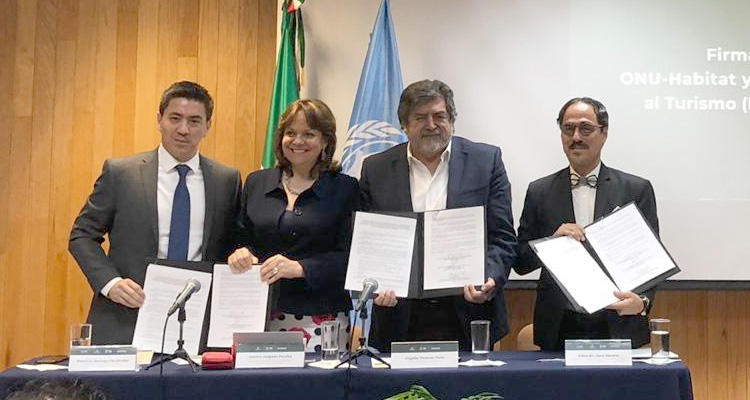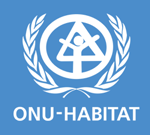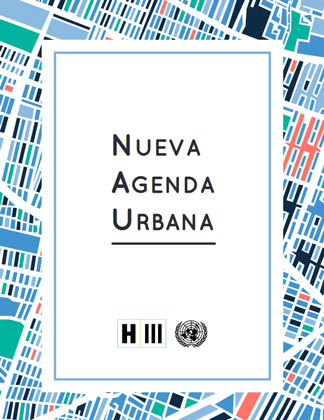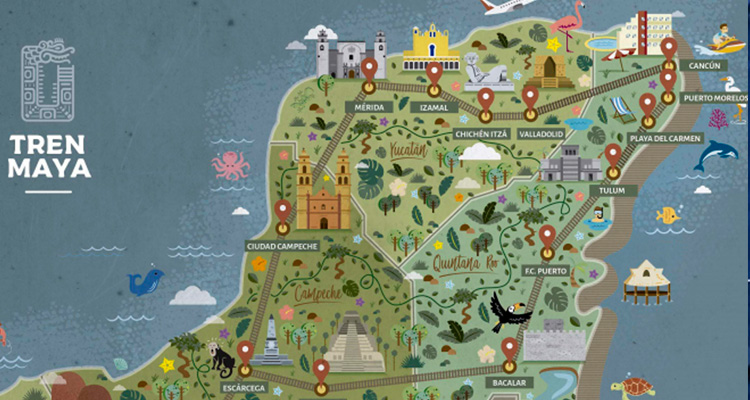
Fonatur and UN-Habitat signed the agreement to implement the project called "Territorial and Urban Integral Development of the Southeast Region of Mexico - Regional Corridor Maya Train"
UN-Habitat Mexico
Mexico City. 21st May, 2019.
The Maya Train will contribute to create a Mexican model of integral development for the southeast of Mexico.
The National Fund for Tourism Development (FONATUR) and the United Nations Human Settlements Programme (UN-Habitat) signed an agreement to collaborate in the regional, territorial and urban integral development of the southeast region of Mexico, through the Maya Train.
The Integral Development of the Southeast Region of Mexico represents a long-term national strategy, which purpose is to improve the living conditions of the population, create shared prosperity in the region by preserving the environment, the tangible and intangible cultural heritage as well as its historical identity.
 In this regard, Eduardo López Moreno, Interim Director of UN-Habitat, pointed out the importance of not considering the Maya Train as an object, but as a regional integral development project. He assured that "Ain't 1,525 km of tracks, but 1,525 km of opportunities that will improve the quality of life of all the residents from the Mexican southeast." The Maya Train will carry rights and opportunities to this region that is one of the most lagging in the country. There is a historical debt with the southeast of Mexico".
In this regard, Eduardo López Moreno, Interim Director of UN-Habitat, pointed out the importance of not considering the Maya Train as an object, but as a regional integral development project. He assured that "Ain't 1,525 km of tracks, but 1,525 km of opportunities that will improve the quality of life of all the residents from the Mexican southeast." The Maya Train will carry rights and opportunities to this region that is one of the most lagging in the country. There is a historical debt with the southeast of Mexico".
 For her part, the Undersecretary for Multilateral Affairs and Human Rights of Foreign Affairs, Martha Delgado, said that the signing of the collaboration agreement between Fonatur and UN-Habitat is another example of the Mexican Government for working according to international standards on urban development and territorial ordering.
For her part, the Undersecretary for Multilateral Affairs and Human Rights of Foreign Affairs, Martha Delgado, said that the signing of the collaboration agreement between Fonatur and UN-Habitat is another example of the Mexican Government for working according to international standards on urban development and territorial ordering.
 Finally, Rogelio Jiménez Pons, Director of FONATUR, said that it is possible to apply better policies in the region and to take up a very important and large public investment opportunity to reorient the development model (...) we are going to look for the best alternatives for development and they must have a scientific, real and objective basis. We have to transcend the occurrences and get that the proposals and work allow public investment to transcend other areas and multiply.
Finally, Rogelio Jiménez Pons, Director of FONATUR, said that it is possible to apply better policies in the region and to take up a very important and large public investment opportunity to reorient the development model (...) we are going to look for the best alternatives for development and they must have a scientific, real and objective basis. We have to transcend the occurrences and get that the proposals and work allow public investment to transcend other areas and multiply.
A region without a clear regional planning and without human settlements properly hierarchized may suffer from backwardness, poverty and lack of opportunities. In this regard, UN-Habitat studies show that in one of every four successful regional development projects, the most important trigger for shared prosperity is the connectivity infrastructure.
During the signing of the agreement it was highlighted that the Maya Train is a project focused on integral development that is structured in the following three points:
- Social development to expand the access to opportunities, urban services, culture, recreation, quality of life and rights.
- Economic development to reduce inequalities through a shared welfare model.
- Territorial, regional and urban development to bring services to remote areas, create poles of development, create infrastructures with a strategic on point urbanization that protects the environment and preserves the archaeological zones.
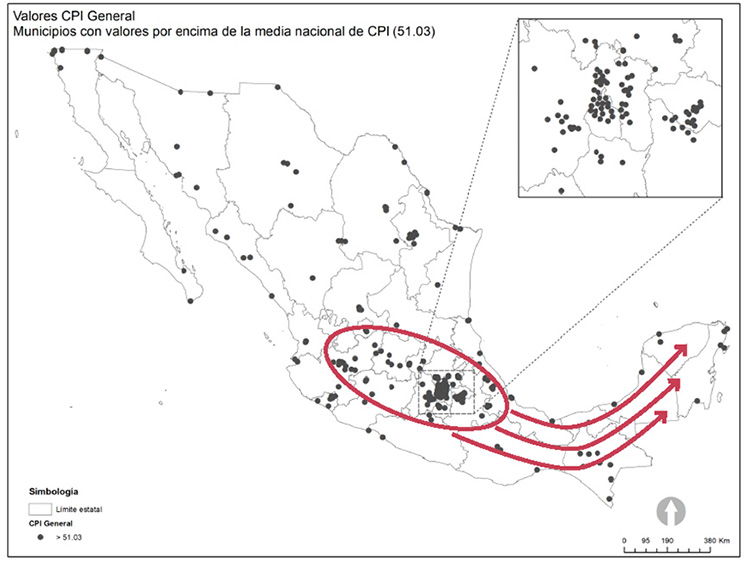
UN-Habitat will provide substantive and technical support to FONATUR in the definition of the parameters and strategies necessary to build a comprehensive development proposal in the Mexican southeast, that will create well-being, development and opportunities for this region as a way to settle a historical debt, reduce inequalities and improve the quality of life, under the essential premise of preserving the natural and cultural heritage of the region.
This collaboration is based on:
- Creating a regional corridor based on a land-use planning scheme.
- Redefining the regional system of cities.
- Rethinking and change the comparative advantages of the micro-regions.
- Defining the intermediation roles of some cities to articulate urban and rural areas.
- Avoiding the generation of inequalities in the territory.
